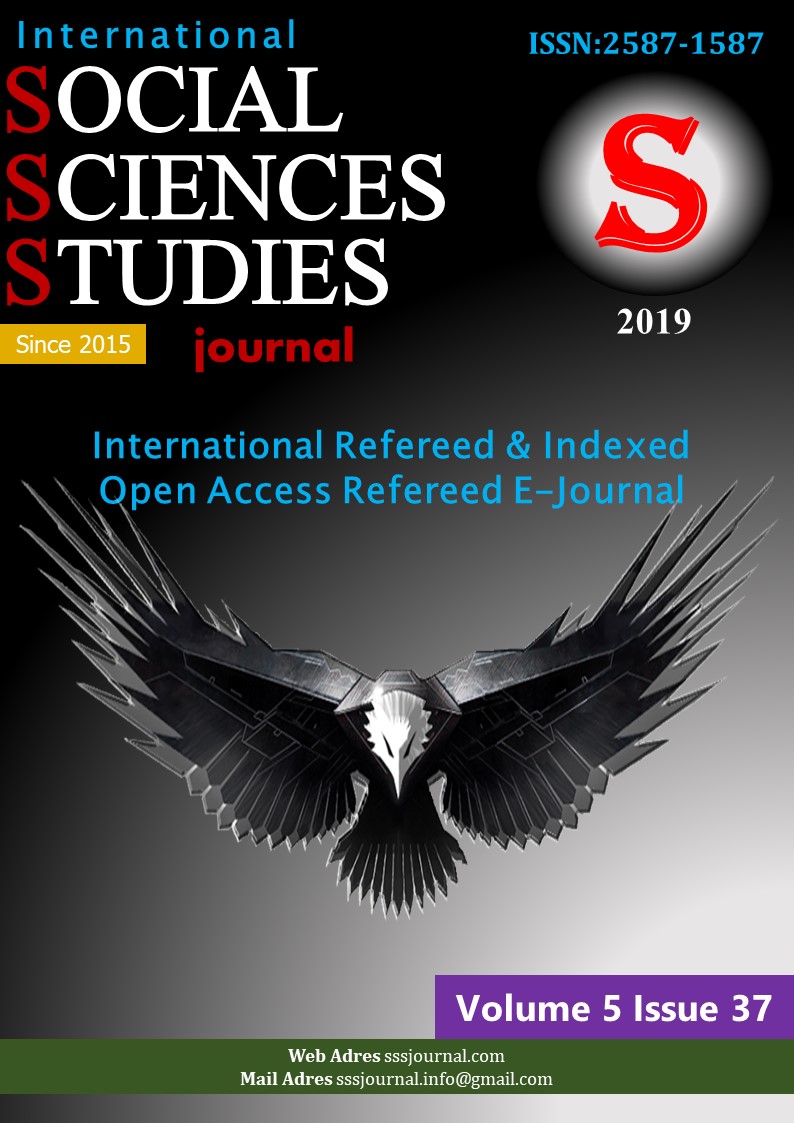Suriyelilerin Göç, Vatandaşlık, Geri Dönüş Eğilimleri ve Ekonomik Etkileri: Siirt Üniversitesi Suriye Kökenli Öğrenciler Örneği
Author :
Abstract
Suriye'de yaşanan çatışmaların uzun sürmesi, 21. yüzyılın en büyük uluslararası sınır aşan kitlesel nüfus hareketine neden olmuştur. Bu büyük göç hareketinde de komşu ülkeler ilk hedef haline gelmiştir. Türkiye, pek çok nedenden ötürü Suriyeli göçmenlere karşı açık kapı politikası izlemiştir. Bu politika sonucunda da dünyada en çok Suriyeli göçmene ev sahipliği yapan dolayısıyla da en çok maliyete katlanan ülke olmuştur. Suriye'de yaşanan sorunun kısa vadede çözüleceğine dair en küçük bir belirti dahi görülmemektedir. Bu da göçmenlerin Türkiye'de kalma süresinin uzayacağını ifade etmektedir. Göçmenler için ev sahibi ülkede kalma süresinin uzaması geri dönme isteğini azaltabilir. Hatta ev sahibi ülkede doğan çocuklar için vatandaşı olunan ülke herhangi bir ülkeden farklı bir anlam ifade etmeyebilir. Bu da göçmenlerin ev sahibi ülkede kalıcı olmasına, gönüllü olarak ülkelerine geri dönmek istememelerine neden olabilir. Göçmenlerin kalıcı olması ise ev sahibi ülkede ciddi sosyo-ekonomik sorunlara sebep olabilir. Çalışmada, üniversite ölçeğinde Suriye kökenli öğrencilerin göç, vatandaşlık, geri dönüş eğilimleri ve bu eğilimlerin ekonomik etkileri incelenmektedir.
Keywords
Abstract
Lasting too long the Syria conflict has caused the biggest international mass population movement in the 21st century. In this mass migration movement the neighbouring countries have become the destination. Turkey has followed an open door policy due to many reasons. As the result of this policy, Turkey has become the host of the biggest Syrian migrant population and this has caused Turkey to be the biggest bearer of the related costs. There is no sign of conflict in Syria ending anytime soon. And this means that the residence time of the migrants in Turkey will become longer. For migrants, this might mean a lowered tendency to return. For migrant children who were born in Turkey, this may even mean they become indifferent to their country of origin. This might lead to migrants to become permanent residents in their host country and might create an unwillingness to return to their home country. And migrants becoming permanent residents might cause serious socio-economical problems. In this study, in a university scale, migration, citizenship and return tendencies of students of Syrian origin and economical impacts of these tendencies have been researched.
Keywords
- AA, Anadolu Ajansı (2018) https://www.aa.com.tr/tr/turkiye/ramazan-bayrami-icin-giden-50-bin-suriyeli-
- AA, Anadolu Ajansı (2018) https://www.aa.com.tr/tr/turkiye/ramazan-bayrami-icin-giden-50-bin-suriyeli- turkiyeye-donmedi/1246722 (Erişim tarihi: 25.03.2019)
- BM, Birleşmiş Milletler (1948) İnsan Hakları Evrensel Beyannamesi https://www.un.org/en/udhrbook/pdf/udhr_booklet_en_web.pdf (Erişim tarihi: 25.03.2019)
- BM, Birleşmiş Milletler (2019) https://population.un.org/ (Erişim tarihi: 17.05.2019)
- BMMYK, Birleşmiş Milletler Mülteciler Yüksek Komiserliği (1951) https://www.unhcr.org/protection/travaux/4ca34be29/refugee-convention-1951-travaux-preparatoires-
- analysed-commentary-dr-paul.html (Erişim tarihi: 25.03.2019)
- BMMYK, Birleşmiş Milletler Mülteciler Yüksek Komiserliği (2019) https://data2.unhcr.org/en/situations/syria (Erişim tarihi: 17.05.2019)
- Distance Calculator (2019) https://www.distancecalculator.net/ (Erişim tarihi: 25.03.2019)
- GİGM, Göç İdaresi Genel Müdürlüğü (2019) http://www.goc.gov.tr/icerik3/gecici-koruma_363_378_4713 (Erişim tarihi: 17.05.2019)
- GİGM, Göç İdaresi Genel Müdürlüğü (2019) Türkiye'de Geçici Korumahttp://www.goc.gov.tr/icerik3/turkiye%E2%80%99de-gecici-koruma_409_558_1097 (Erişim tarihi: 17.05.2019)
- IOM, International Organization for Migration (2019) Key Migration Terms https://www.iom.int/key- migration-terms (Erişim tarihi: 25.03.2019)
- Resmi Gazete (1961) Mültecilerin Hukuki Durumuna Dair Sözleşme http://www.resmigazete.gov.tr/arsiv/10898.pdf (Erişim tarihi: 25.03.2019)
- Resmi Gazete (1968) Mültecilerin Hukuki Durumuna Dair Protokol http://www.resmigazete.gov.tr/arsiv/12968.pdf (Erişim tarihi: 25.03.2019)
- Resmi Gazete (1994) Türkiye'ye İltica Eden veya Başka Bir Ülkeye İltica Etmek Üzere Türkiye'denİkamet İzni Talep Eden Münferit Yabancılar ile Topluca Sığınma Amacıyla Sınırlarımıza GelenYabancılara ve Olabilecek Nüfus Hareketlerine Uygulanacak Usul ve Esaslar Hakkında YönetmelikResmi Gazete (2013) Yabancılar ve Uluslararası Koruma Kanunu http://www.resmigazete.gov.tr/eskiler/2013/04/20130411-2.htm (Erişim tarihi: 25.03.2019)
- Resmi Gazete (2014) Geçici Koruma Yönetmeliği http://www.resmigazete.gov.tr/eskiler/2014/10/20141022-15-1.pdf (Erişim tarihi: 25.03.2019)
- Resmi Gazete (2016) Geçici Koruma Sağlanan Yabancıların Çalışma İzinlerine Dair Yönetmelik http://www.resmigazete.gov.tr/eskiler/2016/01/20160115-23.pdf (Erişim tarihi: 25.03.2019)
- TÜİK,Türkiye İstatistik Kurumu, (2019a) Haber Bülteni http://www.tuik.gov.tr/PreHaberBultenleri.do?id=30690 (Erişim tarihi: 25.03.2019)
- TÜİK, Türkiye İstatistik Kurumu (2019b) Haber Bülteni http://www.tuik.gov.tr/PreHaberBultenleri.do?id=30708 (Erişim tarihi: 25.03.2019)
- TÜRKSAM, Türkiye Uluslararası İlişkiler ve Stratejik Araştırmalar Merkezi (2019), Göç Bülteni, http://turksam.org/994028-2 (Erişim tarihi: 25.03.2019)





